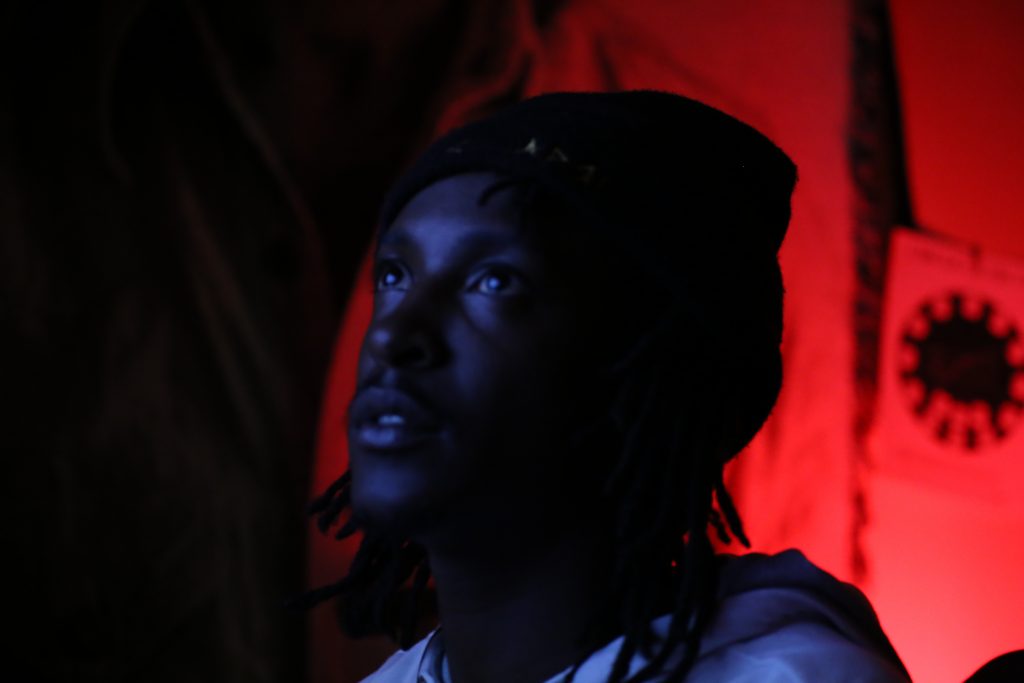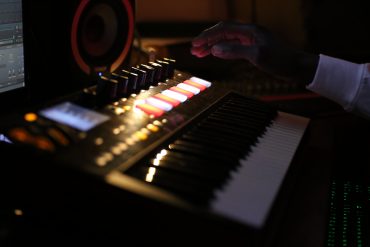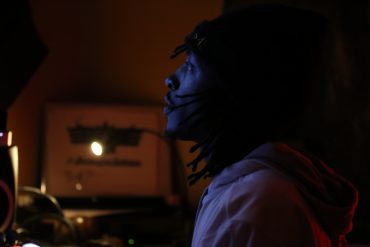
Shabazz Hilaire’s fingers glide across the mix board as he taps out each line, rhythms appearing on screen like cans of paint spilling down the sidewalk.
Hilaire (more often known as just Shabazz) is in the back of MassApparel, a store he co-owns on Cambridge Street in Allston that functions as a revolving door for local designers lacking a display space of their own. Rows of shirts line the tables out front, backpacks decorate the walls, and a glass encase yields a spread of pins. One of the highlights in the case shows Drake with a single, blue tear running down his cheek.
The backdoor leads to The Dojo, Shabazz’s studio. It’s a small space with sand-colored walls, cracked, red clay-tinted floors, and dominating speakers that hum in your chest as if they sat between your lungs. He prefers working in the dark, often losing track of time until he steps out and finds it’s morning.
At age nine, Shabazz sat behind his first drum set. He remembers the moment his body caught up to his mind, a boy suddenly in command of an instrument.
 “It felt like magic,” he says simply.
“It felt like magic,” he says simply.
Drumming led to producing music, spending all his free time inside mixing in his basement throughout his teenage years. It would be easy to say this was always his dream; drumming made sense and he played so well, his elementary school teacher introduced him to the middle school band to prove his skills were several grades more matured than his peers — but then he went to vocational school.
“I didn’t think it was something serious,” Shabazz adds. “That’s why I did stuff like joining the military to find myself and come back to who I am.”
Shabazz takes off his camo jacket, much looser now than in the service. He shows me photos from Afghanistan. Shabazz stands backboard-straight, stone faced with a crew cut in his uniform. He looks like another man, somehow older at 19 than the 27-year-old in front of me. Dreads peak out of his black beanie, framing a fresh faced angular smile he wears often.
“I feel like that was my young age sacrifice I went through to find my spirit trail— I survived,” Shabazz said.
Before the military, he rode bikes with kids in his Brockton neighborhood, boxed in the streets, and wrestled whenever he wasn’t making music, finding anyway he could to feed his adrenaline. Shabazz found trouble often, leaving a handful of decisions he insists on leaving behind.
I asked if he still keeps up with the friends that saw him through his years of rebellion.
“Yeah some of them, but life happens. Some of them have kids and stuff, some of them passed away.”
Gun violence claimed seven of his friends’ lives. Cancer took one, a motorcycle accident silenced another, and, most recently, he lost two friends to cocaine and heroin.
“It came to a point where I would not cry anymore,” he explains. “I still can’t talk about it. I don’t have the words to explain, but it’s part of why I grind so hard.”
Trying to find some future outside of their neighborhood, Shabazz’s brother made a deal with him: if Shabazz promised to sign up for the Marines, his brother would join too. Recruiters watched Shabazz’s wrestling matches in high school and noted his directionlessness, a perfect target for persistent recruiters.
His brother bailed during the application process though, leaving Shabazz with a six-year contract, a plane ride to California at 19, and a new life alone at boot camp.
“I could have been a supply guy or a cook or a radio operator,” he says. “Me already being a music head,a radio operator made sense.”

Shabazz called air strikes, kept soldiers supplied, and never stayed in one position or place too long. He said Afghanistan smelled like life— dirt, air, animals and feces. A stray cat named Oreo wandered base alongside him. Marines called Shabazz “Beat-thoven” because people at camp had never heard music like his before.
“I brought my keyboard out there, so when I had downtime, I would get into my own little world, getting away from whatever I saw. Music never left me; I was kind of wandering around in life and it just brought me back on this path.”
A sheet of paper pinned inside his studio that reads “My Goals!” With general aspirations like, “never let low vibrations slow me down, Good Vibes only” written down, Shabazz’s list reads as optimistically as a set of New Year’s resolutions, but Shabazz lives his list intentionally.
“Even coming back and living life, I’m still going through all of it,” he says. “When I see that list, I get refocused, reinspired.”
After his return from Afghanistan five years ago, he linked with an old friend from school, Brook Giday, otherwise known as Mr. Irie. Shabazz set down in Allston, where he met Nick Urcivolo and Tiago Fernandes, co-owners of MassApparel.
MassApparel had started out of a truck weaving through Boston and the surrounding suburbs, selling original clothes on streets and sidewalks. They maintained the truck until the fall of 2013 when they opened their marquee storefront on Cambridge Street. The owners showed Shabazz and Mr. Irie their makeshift studio behind the shop, handing Shabazz the opportunity to mold the space into his own.
If you walk by the shop at night, Shabazz covers the front glass with a curtain. Behind the veil, you might find a fashion show, a signing, a video release, or a small concert he’s cultivated. Regional artists like NliteN or KING J are booked every week. Dance circles open up in the audience while kids weave in and out of the center, swarming around the merch tables. Like his list on the wall, Shabazz keeps his business simple and sage.
“I don’t keep myself in a negative mood because that manifests in my reality; law of attraction, pretty much,” he said. “Remember where you’re going and where you came from. Don’t get distracted.”
Shabazz’s story is a testament to the notion that, sometimes, you have to leave to know what you left behind. If you really love it, you carry it with you no matter how far you travel or what your circumstances tell you.
“I wasn’t just Shabazz out of nowhere,” he concludes. “You are where you grow up.”
